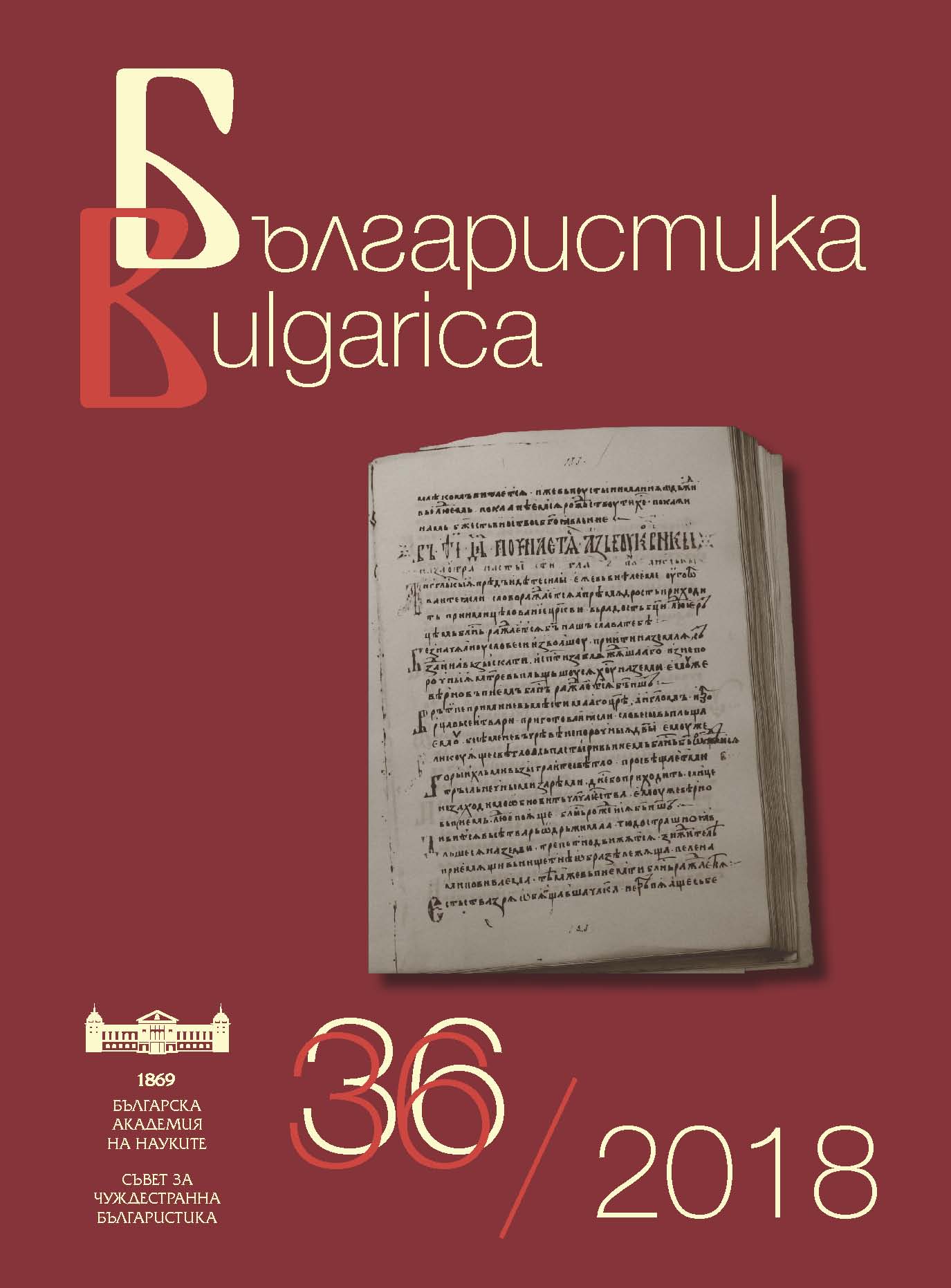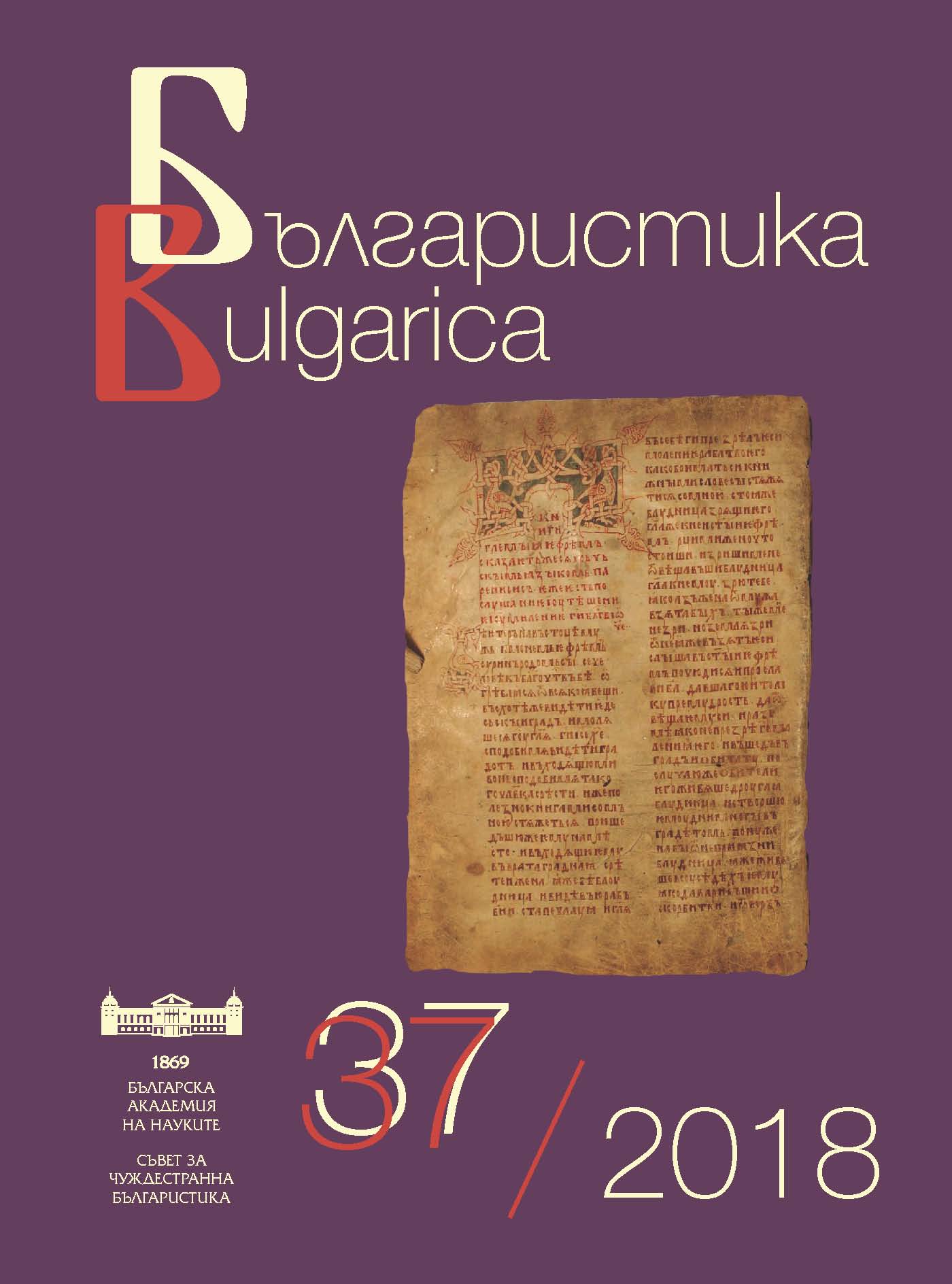
Гласът на българистиката в Европа
Round table "Bulgarian Studies in Europe: "Present and Future", Sofia, 11–12 May 2018.
More...We kindly inform you that, as long as the subject affiliation of our 300.000+ articles is in progress, you might get unsufficient or no results on your third level or second level search. In this case, please broaden your search criteria.

Round table "Bulgarian Studies in Europe: "Present and Future", Sofia, 11–12 May 2018.
More...
Selected bibliography in the field of Bulgarian Studies published in the current year.
More...
The content of the main Bulgarian scientific journals for the current year in linguistics, literature, history, folklore, ethnography, archaeology and art studies.
More...
We rarely find a document to show us the motivation with which a researcher sits to write a book. In the personal archive of Hristo Gandev, kept in the Central State Archives, a notebook is preserved, in which the Bulgarian historian wrote a short note on why and how he should write his study about the great Bulgarian revolutionary Vasil Levski. Here, this text is published for the first time and is delivered without abbreviations and in its authentic style, spelling and language.
More...

Big Data technologies are about how to extract information from the rough data. The intermediate stage is represented by preprocessed data. But, even from preprocessed data to information the way is long and complex. First of all, we must understand what information means. There is no widely accepted definition for information. By proposing and using a working definition for the concept of information, we present the main techniques involved on the way from the rough data to the useful information. How the information is generated, extracted and how it emerges is shortly introduced. The role played by information in the knowledge process leads to the way information, as structure acting by its meaning, must reconsider the philosophical approach of existence.
More...
With interdisciplinary and deeply original and pioneer scientific contributions, Emil Racoviţă was a Romanian biologist and bio-speleologist, founding father of this later discipline, well known all around the world. Hard-worker, with an exemplary scientific probity, with unusual analytical intellect, both in laboratory and in the field investigations, he proved to be a visionary explorer of oceans and caves, and author of general concepts in the evolutionary thought. We celebrate in 2018,150 years since Racoviţă was born. The scientists from the Institute of Speleology (founded by him), together with all biologists from the country, are grateful and proud to continuing his ideal of scientific research of living beings, and to working in their morphology, systematics, ecology, origin, evolution and distribution.
More...
The paper is a critical review of the announced book, and its core is given by the analysis of the arguments and unfolded logic of the book put face to face with their effects.In this way, both the book and the review are parts of the necessary dialogue concerning the legitimacy of the irrational. The critical stance does not reproduce at all the mechanical view of the human rationality as mere cold logic, but is opposed to a “critique of the instrumental character of reason from the standpoint of faith”. From an epistemological point of view, this critique of extreme positions (the mechanical rationality and faith) draws attention to the necessity of a permanent awareness of researchers and common people, too, concerning the consequences of their theories.
More...
My paper relates Bachelard’s main epistemological thesis –the new scientific spirit–in the 30s and some present tendencies in science. In its “Noumène et microphysique”, from 1931, Bachelard reveals a revolutionary change in the 20th century natural science: the definite proof of insufficiency of the traditional pattern of experimental physics of macro-bodies and searching for observable causes – where the starting point of the research was the empirical observation, where the end was to measure the material elements and the values of movements, where the pattern of decomposition were the object and at the same time the aim of researchers –to a complex “intellectualist” model where the most important moments of the research are the (new) theories/new conjectures which no longer assume the logic of isolating the phenomena from their context, where these phenomena are rather relations and effects than material particles, and where the scientific theory follows just the relations and effects which constitute the new objects, and not so much the material objects as such as in the Newtonian science.And: where the understanding of this relational reality is the result of mathematical forms which are not a simple calculus of visible phenomena, but expressions of the internal deep constitution and laws of existence. In this new type of research, the empirical observation is only a starting point and a moment between the theoretical construction and its mathematical clearer manifestation and proof back and forth.All these elements are developed by Bachelard and are considered here as a mirror (or, rather, a beacon, or, not in a metaphorical language, a criterion) for the present epistemology as this one is visible in some aspects focused on by the present sciences.Indeed, nowadays – and in the trail of Bachelard – and though there is an inertial tendency to put only physics at the origin of the scientific knowledge of the world (and in this sense, to confront the classical model of Newton and Einstein physics), epistemology considers at least three aspects configuring the scientific outlook and, perhaps, world-view: the sciences of the living,givingusnew ways of understanding, including the inanimate material logic, as well as its qualitative progress; the inter and trans-disciplinary relations of the scientific steps,givingnew realms of the world; the holistic approach as methodology and (practical/technological) representation of the world. Therefore, the evolutionary epistemology – whose early representative was Bachelard –allows us to use the same comparative pattern, but concerning a broader space and leading to more refined perspectives about the world.
More...








